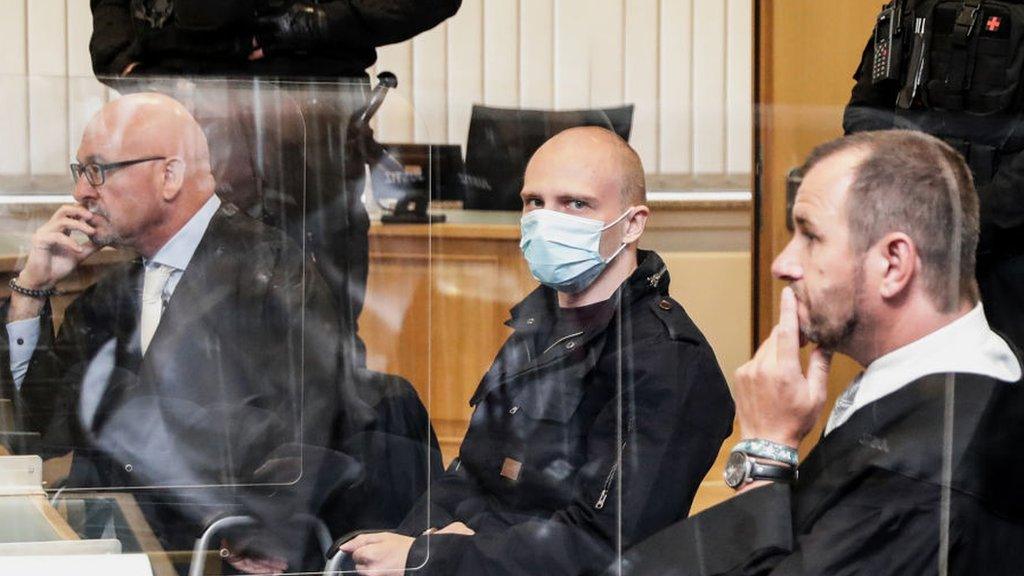Halle synagogue attack: Survivors relive terror in German trial
- Published
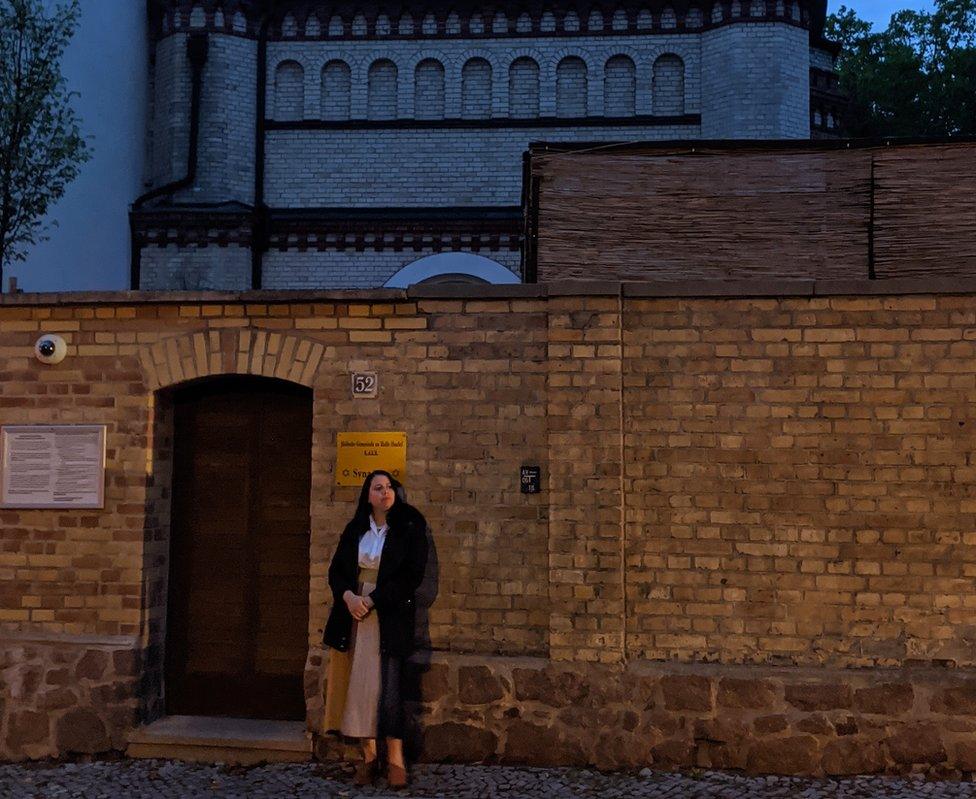
Mollie returned to the synagogue in Halle last month as the trial continued in Magdeburg
It was 9 October 2019 and the Jewish community of Halle in eastern Germany was observing the morning prayer service on Yom Kippur, the holiest day of the year, when a far-right gunman fired shots at the synagogue door in an attempt to attack them.
Among the congregation was Mollie. She had nipped outside to get some fresh air, leaving her prayer book on a pew.
Minutes later, the gunman fired at the door she had just walked through.
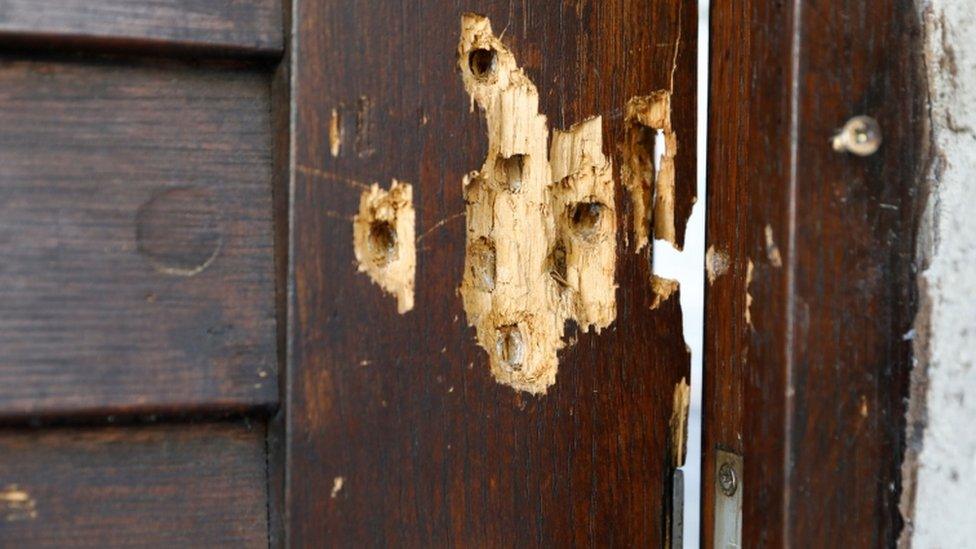
The synagogue's thick wooden door was all that stood in the way of the gunman in Halle last October
Mollie was sitting across the street on a park bench, hidden from view by a water tower. She realised the noise was coming from the direction of the synagogue and intuition told her not to move.
Returning to the synagogue, she saw police and a body lying covered on the ground. Jana L, 40, was the first victim of the Halle shootings.
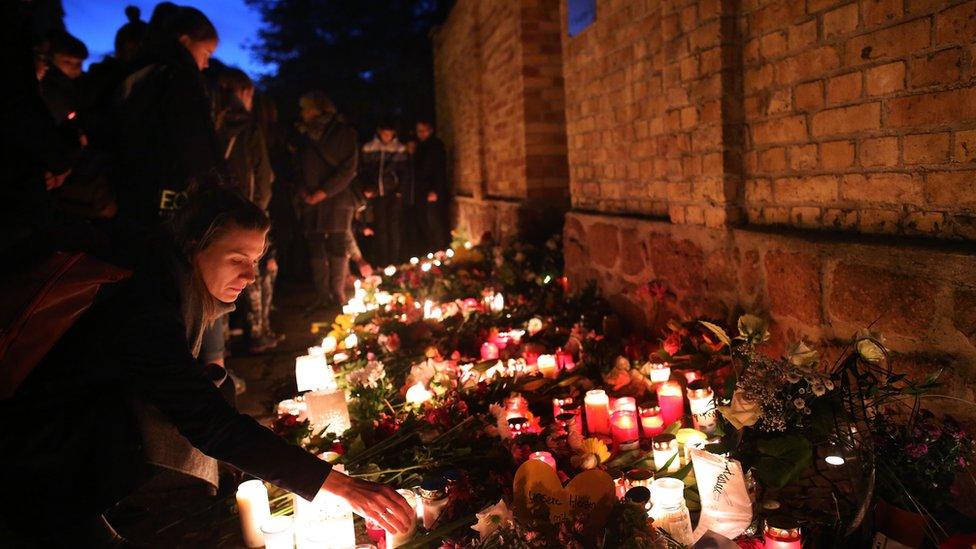
The people of Halle have rallied round the Jewish community but the trial has brought all the memories back
Mollie was quickly bundled indoors, but the gunman was still on the run and went on to kill a second victim, 20-year-old Kevin S, in a nearby kebab restaurant.
Defendant in court
Neo-Nazi Stephan Balliet, 28, confessed before a judge shortly after the Halle murders and went on trial in July. The attack was streamed online for 35 minutes.
I first saw him in court on 1 September, when survivors began giving evidence.
Mollie was called on as the first witness and she asked if I would be her support person throughout the ordeal.
As the defendant walked into the courtroom in handcuffs, he sat down, clearly enjoying the attention of the press photographers, and smirked as he peered into their lenses.
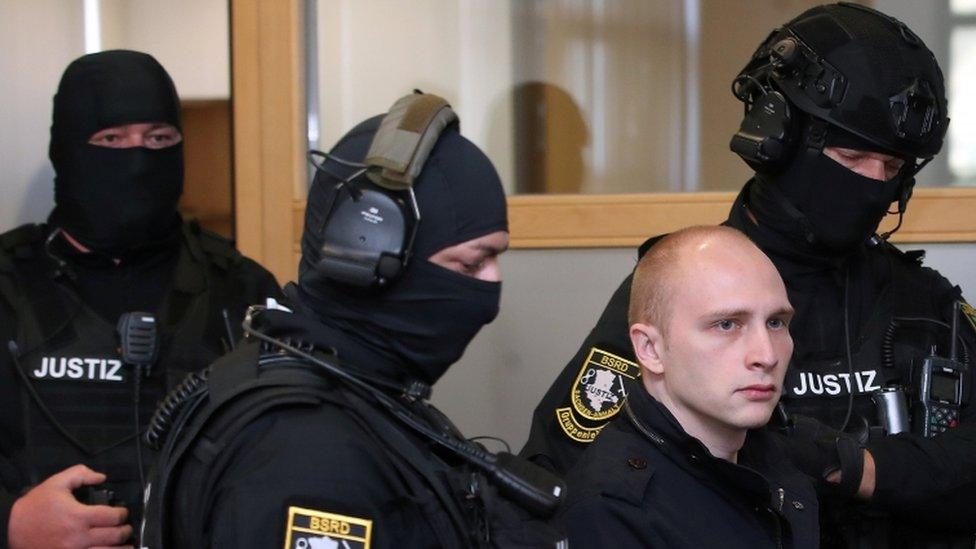
The defendant laughed in court whenever the Holocaust was mentioned
I could not help but notice how physically small he looked.
Survivor takes the stand
Mollie and I are close friends and we are both granddaughters of Holocaust survivors from the former Czechoslovakia.
When she was called to take the stand, Mollie told me that being able to testify was a way of representing more than 100 family members murdered by the Nazis during World War Two. She felt she was speaking not only on her behalf but theirs too.
"For so long, my grandfather was the only survivor in our family," Mollie told the court. "On October 9, 2019, I too joined the ranks of survivors. I stand alongside him."
She was diagnosed with post-traumatic stress: everyday tasks became hard and getting through the day proved difficult. Then, at the end of her testimony, she talked of the gunman: "After today, he will no longer cause me any more personal turmoil. It ends today."
The court applauded.
Christina Feist describes being inside the synagogue as the Halle gunman attempted to attack it
Anti-Semitic theatrics of defendant
Any time the term "Holocaust" was mentioned, the defendant would laugh.
Whenever the judge told the co-plaintiff or witness that their costs would be covered by the court, he made hand gestures signalling "money" in a derogatory manner.
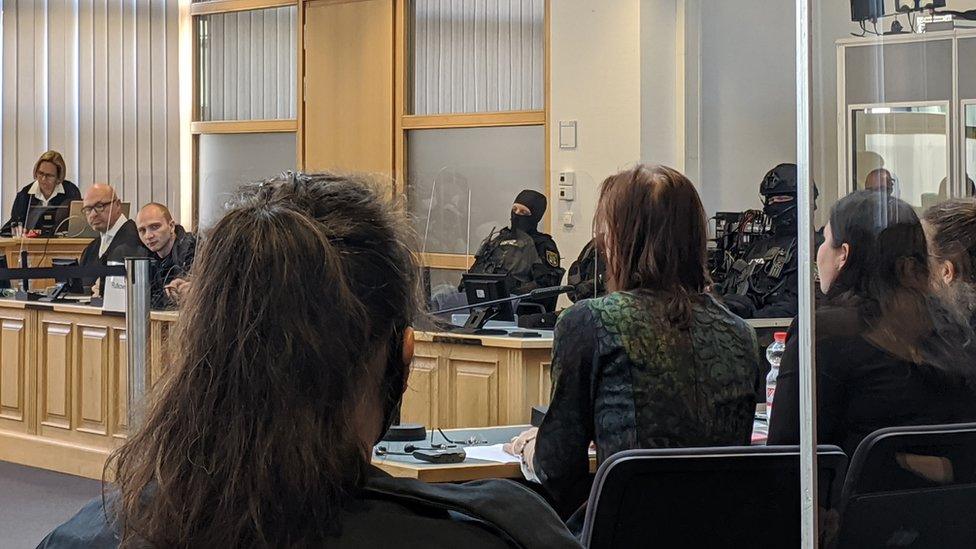
When witnesses gave evidence at the trial, they were faced with a defendant who showed no remorse
When he testified on 22 July, he proclaimed that his attack on the Halle synagogue was not a "mistake" and that the people inside were his "enemies".
However, he did express remorse for the two people that he had fatally shot, as they were white Germans and not a part of a minority group.
During the two days I was in court on 1 and 2 September, he showed sympathy just once: when a German nurse who saw Jana L lying on the ground told the court how the experience had made her confide in her loved ones and that her Christian faith had helped her through a difficult time.
At this point, the defendant apologised, telling the nurse he wished he hadn't harmed her.
How police were unprepared
Throughout much of the evidence ran a theme of a police force ill-equipped to handle the attack in a sensitive manner.
Christina, a co-plaintiff in the case, said she was astounded that on the holiest day of the Jewish calendar there were no police present. The accused merely laughed and shook his head.
The question arose of how the Halle attacker could know more about Jewish high holy days than German police.
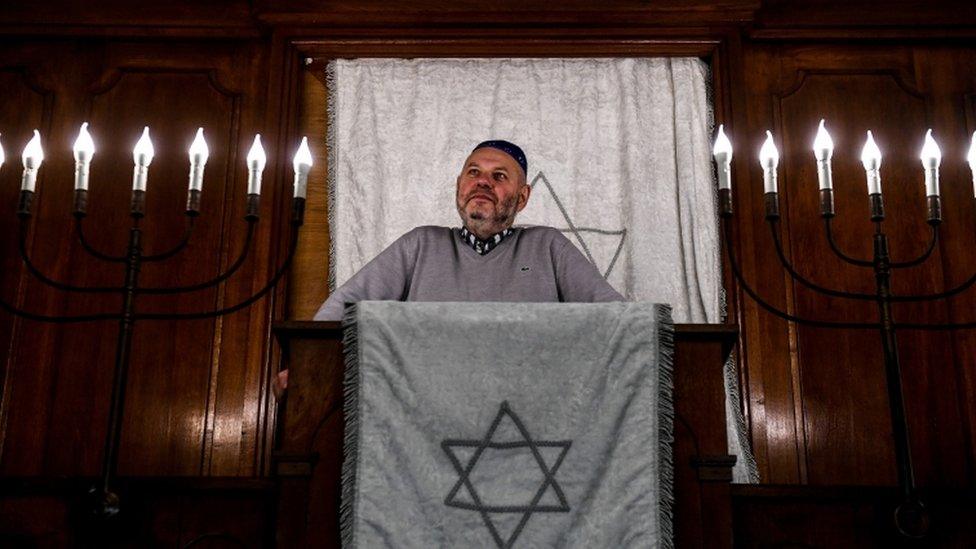
Max Privorozki, the head of the Halle Jewish community, was among the survivors of last year's attack
Rabbi Jeremy Borovitz, head of Jewish learning for the Base Berlin cultural centre, told the BBC that during the attack police "treated us like a burden, and there was definitely a lack of cultural knowledge".
There was a lack of understanding why they were praying in a group, and the rabbi believed that "by addressing this in court, we might contribute towards changing the system".
The BBC has approached Saxony-Anhalt police but has not had a response.
The federal government has allocated funding towards training police on how to report and deal effectively with anti-Semitic crime.
Felix Klein, the German government's Commissioner for Jewish Life in Germany and the Fight against Anti-Semitism, told the BBC he was saddened to hear of the alleged police response, but not surprised.
Ninety percent of anti-Semitic attacks recorded in Germany have had far-right motives, he says. Only this week, a Jewish student was attacked outside a Hamburg synagogue by a man wielding a shovel.
Travelling to Halle and the doner shop
Halle synagogue was not the only building attacked on 9 October 2019.
Immediately after firing at the door, the gunman targeted a doner restaurant two blocks away in the hope that Muslims or immigrants would be eating there.
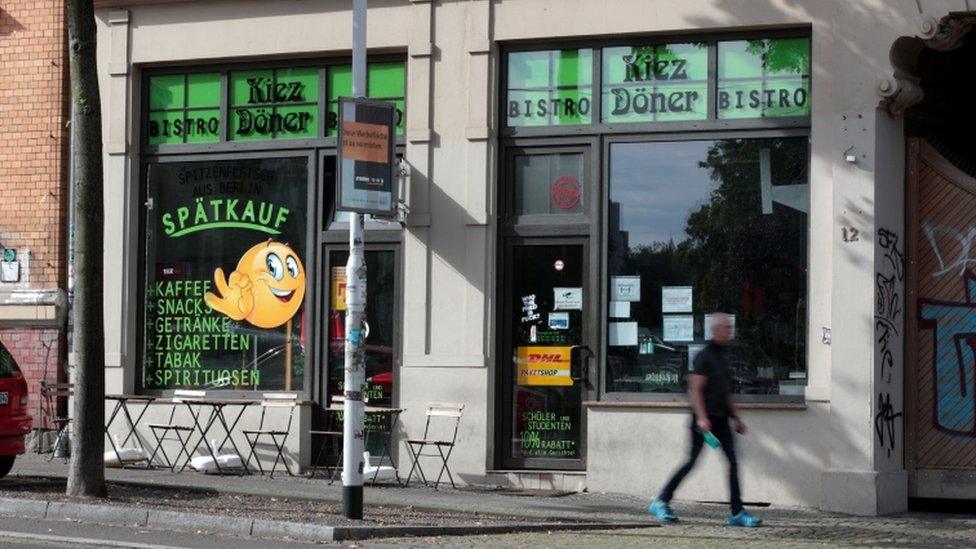
Kevin S was shot dead at the Keiz-Doner restaurant
He fired a large number of bullets, killing Kevin S.
Afterwards, the owner of the Kiez-Doner restaurant handed it over to two workers traumatised by the attack, brothers Ismet and Rifat Tekin.
Mollie and I decided to go to Halle to retrace the day's events and we spent time with Ismet while we were there.
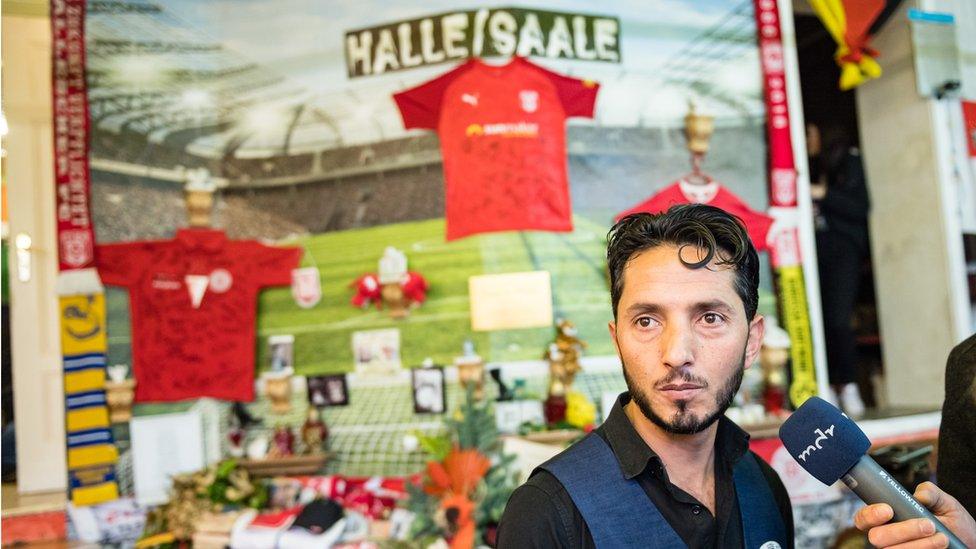
Last November, Ismet Tekin (pictured) and his brother were handed the ownership of the restaurant
He and his brother came to Germany 12 years ago from Turkey and have always enjoyed living in Halle.
"My brother was heavily affected by the attack. I now have to be strong for the both of us," he told me.
While Ismet himself had never had concerns about racism until a year ago, he was now fearful for his children's safety, he said.
Support for victims
Mollie has described "varied layers of support" for the synagogue survivors from both Jewish and non-Jewish groups in Halle.
And there has been help for the victims of the restaurant attacks too. Ismet and Rifat Tekin have struggled to get customers through the doors of the Kiez-Doner, as it has become a memorial to the two who died.
The brothers' lawyer, Onur Ozata, has appealed to the German government for help, as they are faced with the financial impact as well as the emotional effects of the attack.
Mobile victim counselling group MobileOpferberatung has provided four counsellors who specialise in hate crime, with help for mental health problems as well as legal issues and state compensation.
Project manager Antje Arndt says a couple of people from Halle have also provided voluntary support for the brothers.
"The solidarity group was able to offer Ismet a ride to and from Halle to court. It's one of the many ways in which we can work together and it's so nice to see."
The German Jewish student union launched a fundraising campaign and held a a rally this week to mark the anniversary of the 9 October attack.
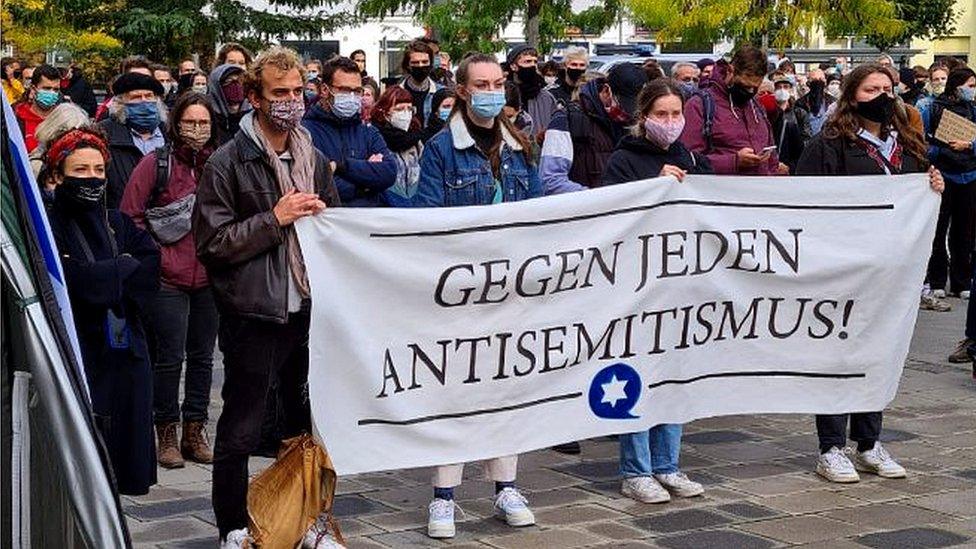
Jewish students in Germany gathered in Halle this week to give the two brothers a donation
Co-plaintiffs gave speeches and the union presented the brothers with a donation of thousands of euros.
Union leader Noa Luft said it showed "people are eager to fight for a more multicultural society here in Germany".
Meanwhile, the trial in Magdeburg continues and is due to finish by the end of the year.
The defendant is accused of two counts of murder and 68 charges of attempted murder and other crimes. If convicted, he faces life in prison.
This story is featured on Heart and Soul, on the BBC World Service
Related topics
- Published21 July 2020
